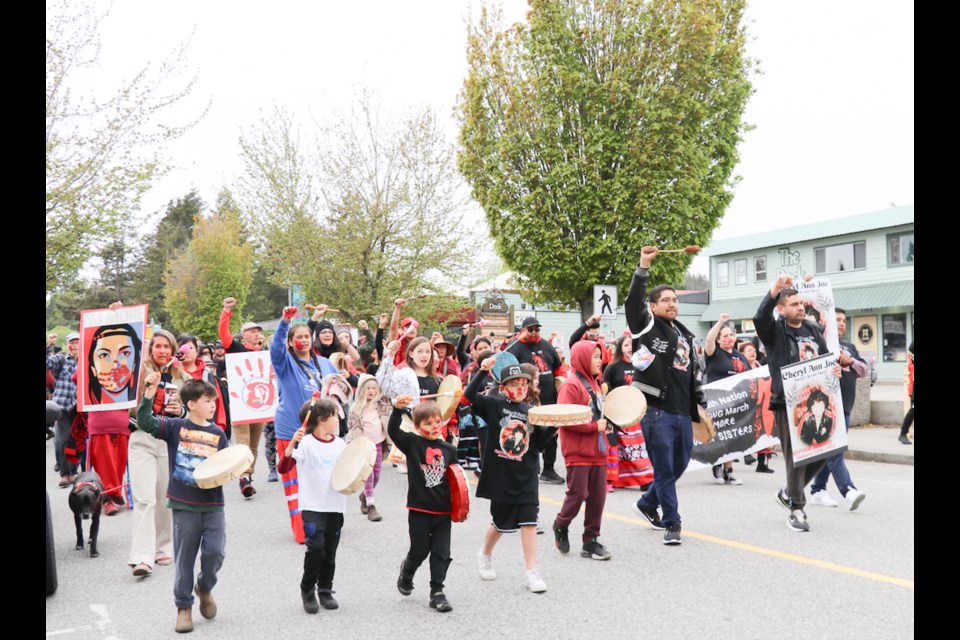Content warning: The following story refers to missing and murdered Indigenous women and girls. Please take care reading.
With Cheryl Ann Joe’s three sons setting pace, hundreds of people wearing red marched through downtown Sechelt Sunday morning in shíshálh Nation’s first annual march for missing and murdered Indigenous women and girls (MMIWG).
May 5 is the national day of awareness for MMIWG, also known as Red Dress Day, and events honouring the missing and murdered women and girls were organized around the country.
The first annual shíshálh march honoured all missing and murdered Indigenous women and girls, those from this territory and particularly Cheryl Ann Joe, a 26-year-old shíshálh Nation woman murdered in Vancouver in 1992.
Joe’s murder was the impetus for the annual Valentine’s Day Women’s Memorial March in Vancouver. In the decades since she died, the awareness that Indigenous women and girls are disproportionately victims of homicide and violence has grown but the gap in homicide rates remains.
Sunday’s march in Sechelt began at 10 a.m. with a song in front of municipal hall, at the corner of Cowrie Street and Ocean Avenue. Joe’s relative and the Nation’s traditional wellness coordinator Alfonso (Sito) Salinas, one of the organizers of the day, led the singing and drumming.
As marchers reached each intersection, the children and drummers gathered in a circle for a song. From intersection to intersection, repeating verses of the Women’s Warrior Song reverberated through the downtown – fists raised at every fourth verse.
Once the hundreds had progressed into Hackett Park and were welcomed, Joe’s family members were blanketed and shared reflections about Joe, the day and the ongoing fight for safety for Indigenous women and girls – as well as men and boys – amid ongoing colonial violence and racism.
“We are here today fighting back the best way we know how – in a non violent way,” said Calvin Joe-Mayes, Joe’s youngest son. “The human spirit is hard to kill. I’m honoured to be here today with each and every one of you showing support.
“The acts of colonization are deep rooted,” he said. “However, by us coming together and marching today in solidarity, we can continue to decolonize our people by setting our differences aside and marching forward together as one mind, one body and one spirit, white, black red or yellow.”
Surrounded by cedar trees, as one family member noted, family also reflected on the fight to keep Joe’s murderer behind bars as he’s come up for parole and the lack of media attention when Indigenous women go missing or are murdered.
As much as the day was about honouring, it was about healing. “These are heavy talks, but this is all medicine, all of us who are here,” Salinas told the crowd. “I want to thank everyone who is just learning about this. This has been a long journey just to get to where we are today and we are starting our healing journey together.”
Following the talking, the kids were invited back before the stage for singing and dancing, to share their medicine.
An afternoon of performances, singing and drumming was scheduled to follow.




